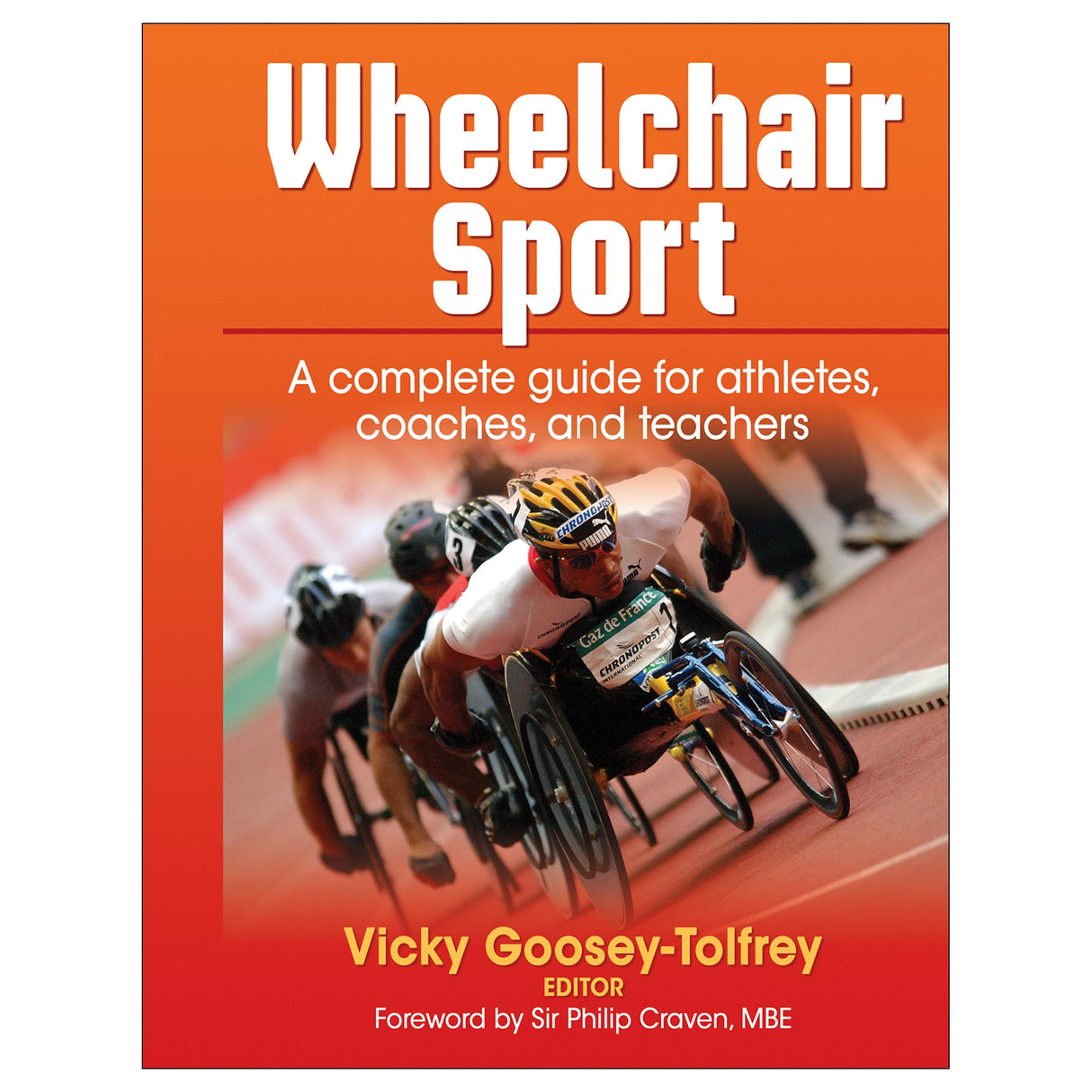Wheelchair Sport
A complete guide for athletes, coaches, and teachers
Author: Vicky Goosey-Tolfrey
$39.00 USD
Wheelchair Sport provides coaches, teachers, and athletes with the information they need to compete and succeed in wheelchair sports. Written by top coaches, athletes, sport scientists, and specialists in sports medicine and physical therapy who work with Paralympic athletes, this resource offers
an explanation of the physiological differences between able-bodied and disabled athletes and the physiological adaptations that result from training; guidelines for training that are customized to wheelchair athletes’ unique needs, including strength and conditioning, nutrition and hydration, and mental wellness; tips on the practical aspects of competing in wheelchair sport, such as optimizing chair set-up and preparing for travel; and expert guidance in developing top-notch training programs for athletes at all skill levels.
People who use wheelchairs have a greater opportunity than ever before to be physically active at the level of their choosing. Wheelchair Sport equips coaches, teachers, and athletes to develop their minds and bodies to their potential and enjoy their participation in sports.
Audience
Resource for wheelchair athletes, coaches, teachers, and practitioners involved with wheelchair sports.
Foreword
Preface
Acknowledgements
Part I: Understanding Wheelchair Sport
Chapter 1. Introduction to Wheelchair Sport
Sean Tweedy and Nik Diaper
Spinal Cord Injury
Health-Related Effects of Wheelchair Sport
Sport Classification
Sports for Wheelchair Athletes
Using Sport Knowledge for Athlete Profiling
Conclusion
References
Chapter 2. Sport Chair Set-Up and Selection
Hsin-yi Liu, Ian M. Rice, Justin Z. Laferrier, Rosemarie Cooper, Mike Boninger, MD, and Rory A. Cooper
Wheelchair Components and Accessories
Basic Wheelchair Set-Up
Sport-Specific Wheelchair Set-Up
Injury Prevention
Conclusion
References
Chapter 3. Physiology of Wheelchair Sport
Vicky Goosey-Tolfrey and Mike Price
Physiological Responses
Training Considerations
Types of Training
Measuring Exercise Intensity and Fitness
Conclusion
References
Chapter 4. Strength and Conditioning for Wheelchair Sport
Andy Allford and Linda Mitchell-Norfolk
Unique Strength Training Needs of Wheelchair Athletes
Needs Analysis
Guidelines for Safe and Effective Training
Guidelines for Exercise Prescription
Strength Training Equipment
Free Weights Versus Fixed Resistance machines
Sample Training Programmes
Conclusion
References
Chapter 5. Nutrition and Body Composition
Tom Reilly and Jeanette Crosland
Eating to Train
Eating to Win
Body Composition
Body Compartments
Assessment Methods
Conclusion
References
Suggested Reading
Suggested Websites
Chapter 6. The Traveling Athlete
Mike Price, Jeanette Crosland, and Nick Webborn MD
Medical Issues Related to Travel
Practical Concerns Related to Flying
Accommodations and Adaptations
Nutrition and Hydration When Travelling
Exercising in the Heat
Conclusion
References
Suggested Reading
Chapter 7. Psychological Aspects of Wheelchair Sport
Elisabeth Bressan and David Shearer
Getting Involved in Wheelchair Sport
Developing Athletes’ Sport Commitment
Understanding Psychological Aspects of Wheelchair Sport
Conclusion
References
Part II: Training for Wheelchair Sports
Chapter 8. Wheelchair Basketball
Mike Frogley
Wheelchair Propulsion
Wheelchair Skills
Power Start and Stop
Half-Court Tow
Forward Partner Pulls
Backward Partner Pulls
Clovers
U-Turns
Hops
Tilting
Christmas Trees
Jump and Recover
Shooting
Passing
Dribbling
Conclusion
Chapter 9. Wheelchair Racing
Dame Tanni Grey-Thompson and Ian Thompson
Chair Set-Up
Gloves
Pushing Technique
Training Programme
Skill and Fitness Training
Racing Tactics for Sprints
Racing Tactics for Endurance
Wheelchair Racing Rules
Conclusion
Chapter 10. Wheelchair Rugby
Kevin Orr and Laurie A. Malone
Game Play and Rules
Classification
Equipment Selection and Maintenance
Fundamental Skills
Rugby Offence
Rugby Defence
Training Programme
Drills for Rugby Skill Development
Ball Pickups
Whistle Drill
Figure-Eight Passing
Caterpillar Passing
Hot Seat Passing
Three-Man Weave
Long Passing
Diamond in the Rough
Four Corners
Skills Testing
Conclusion
Chapter 11. Wheelchair Tennis
Dawn Newbery, Geraint Richards, Stephanie Trill, and Martyn Whait
Ten Steps to the Top
Taping
Attack and Defence Drills
Returning Second Serve
High Forehand
Deep, Short, Deep, Short
Deep, Mid, Short
Bounce–Smash
Hit Down the Line Off a Crosscourt Ball
Hit Crosscourt Off a Down-the-Line Ball
Twenty Shots
Rabbit Ears
Hustle
Mobility Drills
Down the Mountain
Park the Car
Through the Gate
Sprint, Slalom, Reverse
Two-Push Slalom
Half-Court Map
Fan Drill
Agility Drill
Box-Command Drill
Speed Play
Taping
Conclusion
Chapter 12. Handcycling
Thomas Abel, Yves Vanlandewijck, and Joeri Verellen
Training Programmes
Assessment
Training Activities
High-Volume Training
Recovery
Position
Strength for Long and Intensive Routes
Velocity
Mechanical Efficiency
Cadence Versus Power
Nonspecific Training
Steering, Braking, and Accelerating
Riding in Groups
Racing Tactics
Conclusion
Index
About the Editor
About the Contributors
Vicky Goosey-Tolfrey, PhD,is a senior lecturer in exercise physiology and director of the Peter Harrison Centre for Disability Sport at LoughboroughUniversity in Leicestershire, UK. Her work in 1994 with Prof. Ian Campbell and Dame Tanni Grey-Thompson sparked her interest in disability sport, and she went on to earn her PhD in sport science from ManchesterMetropolitanUniversity five years later.
Dr. Goosey-Tolfrey attended the Atlanta 1996 and Sydney 2000 Paralympic Games with the Great Britain wheelchair racing and wheelchair basketball teams, respectively, and was the lead physiology consultant for the British Paralympic Association for the Athens 2004 and Beijing 2008 Games. In her leisure time, she enjoys being with her family, golfing, and watching films.





